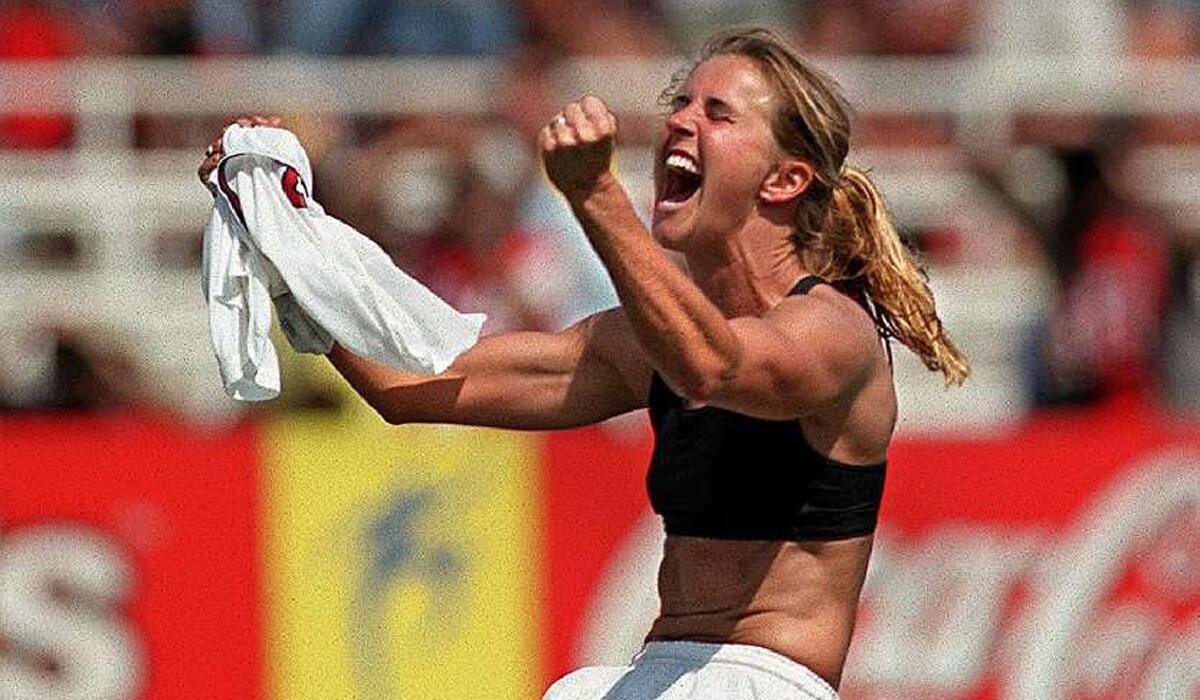Women’s World Cup: Talk of ‘the 99ers’ inspires team to be ‘the 15ers’

The current U.S. Women’s World Cup team will try to get out of the shadow of Brandi Chastain and the “99ers” on Sunday against Japan.
- Share via
Reporting from VANCOUVER, Canada — There’s a shadow hanging over the U.S. team as it prepares for Sunday’s Women’s World Cup final with Japan.
It’s big and it’s dark but it’s been there so long, many outsiders hardly notice it anymore. Inside the American team, however, the shadow of 1999 is inescapable.
That’s the last time the U.S. won a World Cup — 16 years to the day next week. And the only way to lift that cloud is to win another.
“They keep saying ‘the 99ers.’ You hear that all the time, It’s always ‘the 99ers’,” said Fox Sports analyst Cat Whitehill, who played for the U.S. in two World Cups but never got past the semifinals.
“They’re hoping that they can be the 15ers.”
There’s more at stake than just nicknames though. When the U.S. team led by Mia Hamm, Julie Foudy and Michelle Akers won in 1999, it was the Americans’ second title in three World Cups. It looked to be a dynasty in the making.
Since then, the U.S. has only made the final once, four years ago when it lost to Japan on penalty kicks.
“It’s been so long since the last World Cup we brought home,” said forward Alex Morgan, who was 10 when the U.S. won its last championship. “And we know that.”
Why that has happened isn’t as clear. The U.S. has made the semifinals of every World Cup and has won three Olympic finals since 1999. No other country has done either.
But the Americans haven’t won the ultimate prize in women’s soccer since Brandi Chastain put her shirt back on.
“The fact that we haven’t been able to grasp one when it’s been so close kills me,” Foudy said. “What these players have done has been phenomenal. When you put that all in perspective, it still is surprising it’s 16 years.
“You just never know in a World Cup.”
You never know when a player will be expelled, for example, as midfielder Shannon Boxx was in the 2007 semifinals, forcing the U.S. to play the second half short-handed in a game it would lose to Brazil.
You never know when a team is going to give away leads twice — in the final minutes of regulation and again with three minutes left in extra time — as the U.S. did in the 2011 final it would lose to Japan.
“After winning the World Cup,” said U.S. defender Christie Rampone, the lone holdover from the ’99 team “getting close is not good enough.”
Women’s soccer has changed drastically in 16 years. The 2015 World Cup, with 24 teams and 52 games, is bigger and longer than it was in 1999. And countries that once ignored the women’s game are now investing significant amounts of time and money on their national teams.
Germany has twice as many full-time employees in its women’s program as the U.S. does. Brazil has a residency program for its women’s team. China paid its players a handsome bonus for reaching the quarterfinals.
And England, which didn’t give girls the opportunity to play organized soccer when U.S. Coach Jill Ellis was growing up there, now has three top-flight professional leagues for women and a national team that made the semifinals here.
The U.S. team also has gotten better since 1999.
“A whole lot better,” said Briana Scurry, the goalkeeper for the World Cup champion, who said her team’s roster wasn’t nearly as deep as the current one.
But, she added, the better team doesn’t always win.
“You need luck,” Scurry said. “Don’t ever let anybody that has ever won a championship tell you that luck was not involved. That goes with it.
“The weird is always there. You just don’t remember.”
And this U.S. team is one that wants to be remembered. But how?
With 35-year-old Abby Wambach playing in her final World Cup and Hope Solo, 33, and Carli Lloyd, 32, likely doing the same, will it be remembered as the best team never to win a title? Or will it be remembered as the one that finally emerged from beneath a large, dark shadow 16 years in the making?
“This group has a chance to now carve out their legacy,” Ellis said. “They recognize that. They understand what they’re shooting for.
“It would be phenomenal for them.”
Twitter: @kbaxter11
More to Read
Go beyond the scoreboard
Get the latest on L.A.'s teams in the daily Sports Report newsletter.
You may occasionally receive promotional content from the Los Angeles Times.











